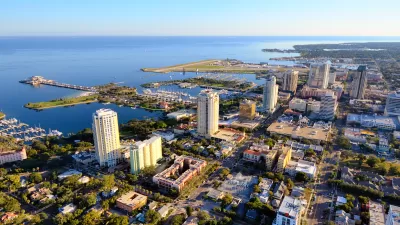Zipcar is a newcomer in Tampa Bay, but the efforts to expand its business in the next few years will provide a case study in how less dense cities can expand alternative transportation options.
Justine Griffin covers the ongoing efforts to expand the use of car-sharing in Tampa Bay, a city that tends not to encourage many people to go carless, like San Francisco, Chicago, or New York can.
According to Griffin, "[c]ar-sharing companies have been in Tampa Bay since before anyone was using the words Uber or Lyft. But the rollout of the business model — which lets users rent a car by the hour or the day usually online or through an app — has been slow to catch on."
Zipcar has been in Tampa for a year, currently operating eight cars, but "the company is preparing to expand its local fleet when the new rental car facility opens at Tampa International Airport next year," writes Griffin. Zipcar "is also talking with transit organizations in Tampa to expand further," according to a Zipcar manager quoted in the article.
Griffin cites another car-sharing service based at the University of South Florida as an example of the quickly growing market for car-sharing services. The question broached by the article is whether the city has enough alternative transportation options to supplement and compliment car-sharing as a business model.
FULL STORY: In shadow of Uber and Lyft, car sharing tries to shape a future in Tampa Bay

Alabama: Trump Terminates Settlements for Black Communities Harmed By Raw Sewage
Trump deemed the landmark civil rights agreement “illegal DEI and environmental justice policy.”

Planetizen Federal Action Tracker
A weekly monitor of how Trump’s orders and actions are impacting planners and planning in America.

The 120 Year Old Tiny Home Villages That Sheltered San Francisco’s Earthquake Refugees
More than a century ago, San Francisco mobilized to house thousands of residents displaced by the 1906 earthquake. Could their strategy offer a model for the present?

In Both Crashes and Crime, Public Transportation is Far Safer than Driving
Contrary to popular assumptions, public transportation has far lower crash and crime rates than automobile travel. For safer communities, improve and encourage transit travel.

Report: Zoning Reforms Should Complement Nashville’s Ambitious Transit Plan
Without reform, restrictive zoning codes will limit the impact of the city’s planned transit expansion and could exclude some of the residents who depend on transit the most.

Judge Orders Release of Frozen IRA, IIJA Funding
The decision is a victory for environmental groups who charged that freezing funds for critical infrastructure and disaster response programs caused “real and irreparable harm” to communities.
Urban Design for Planners 1: Software Tools
This six-course series explores essential urban design concepts using open source software and equips planners with the tools they need to participate fully in the urban design process.
Planning for Universal Design
Learn the tools for implementing Universal Design in planning regulations.
Clanton & Associates, Inc.
Jessamine County Fiscal Court
Institute for Housing and Urban Development Studies (IHS)
City of Grandview
Harvard GSD Executive Education
Toledo-Lucas County Plan Commissions
Salt Lake City
NYU Wagner Graduate School of Public Service





























